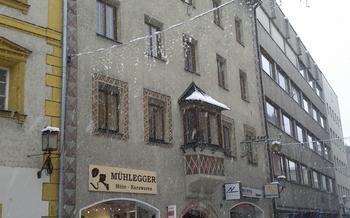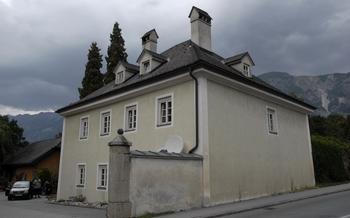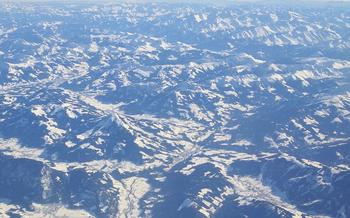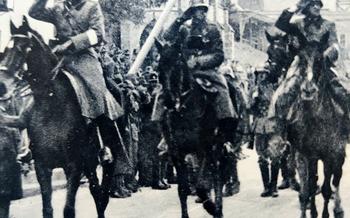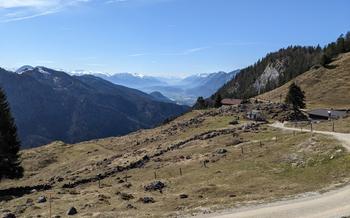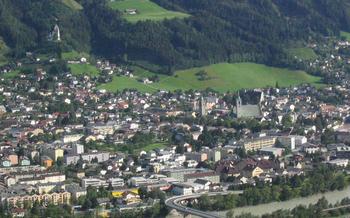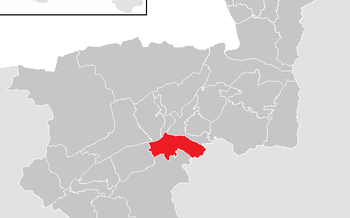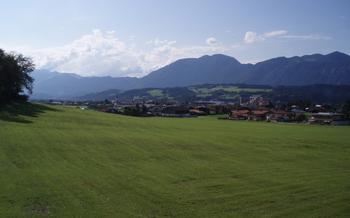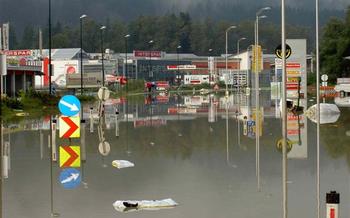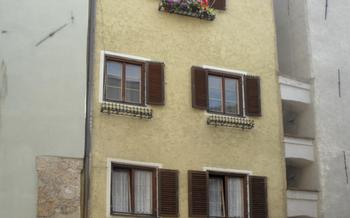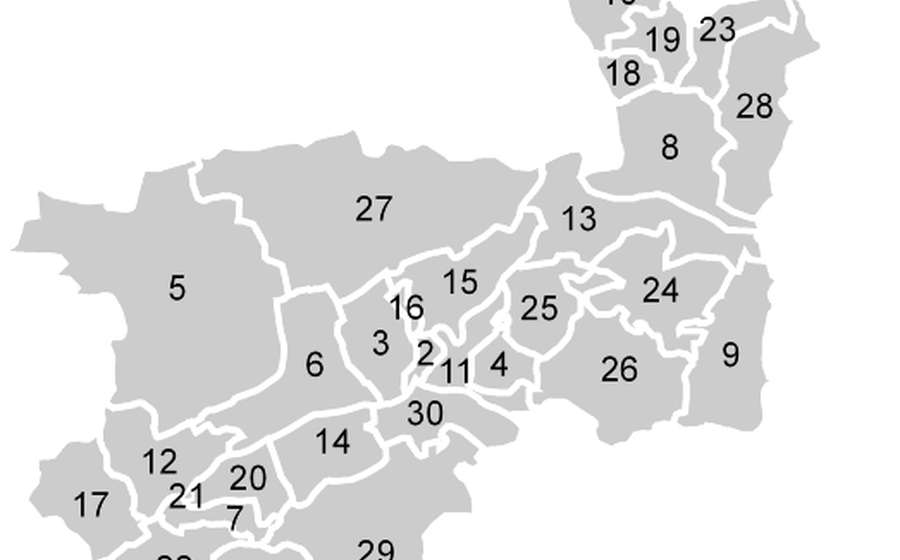
Alpbachtal
- Alpbachtal: A Tyrolean Paradise
- Where is the Alpbachtal?
- What makes the Alpbachtal special?
- How to get to the Alpbachtal?
- Where to stay in the Alpbachtal?
- Hiking in the Alpbachtal
- Biking in the Alpbachtal: A Thrilling Adventure for Cyclists of All Levels
- Tips for Biking in the Alpbachtal:
- Safety Precautions for Biking in the Alps:
- Where to Rent Bikes in the Alpbachtal:
- Visiting the Alpbachtal in the Summer
- Alpbach: The Most Beautiful Village in Austria
- Rattenberg: A Medieval Town on the Inn River
- Kufstein: A City of Art and Culture
- Schwaz: A Silver Mining Town
- Jenbach: A Transportation Hub
- Brixlegg: A Town with a Rich History
- Wildschönau: A Valley of Natural Beauty
- Going Out in the Alpbachtal
- Insider Tip:
- Insider Tip
Alpbachtal: A Tyrolean Paradise
Situated in the heart of the Tyrolean Alps, the Alpbachtal is a stunning valley that offers a perfect blend of natural beauty and cultural charm. Nestled between the Kitzbühel Alps and the Rofan Mountains, the valley is home to picturesque villages, lush meadows, sparkling lakes, and towering peaks. It is a paradise for outdoor enthusiasts, with endless opportunities for hiking, biking, swimming, and skiing. The region is also rich in history and culture, with many charming towns and villages to explore. Whether you're looking for an active adventure or a relaxing retreat, the Alpbachtal has something to offer everyone.
Where is the Alpbachtal?
The Alpbachtal is located in the state of Tyrol, in western Austria. The valley is easily accessible by car, train, or bus. The nearest airport is Innsbruck, which is about 50 kilometers away.
What makes the Alpbachtal special?
The Alpbachtal is a special place for many reasons. The stunning scenery, the friendly locals, and the abundance of outdoor activities make it a popular destination for tourists from all over the world. The valley is also home to a number of unique traditions and customs, such as the annual "Almabtrieb," or cattle drive, which takes place in the fall.
How to get to the Alpbachtal?
The Alpbachtal is easily accessible by car, train, or bus. The nearest airport is Innsbruck, which is about 50 kilometers away. There are several direct trains that run from Innsbruck to Wörgl, the main town in the Alpbachtal. From Wörgl, you can take a bus or a taxi to your destination.
Where to stay in the Alpbachtal?
The Alpbachtal offers a wide range of accommodation options, from traditional guesthouses to luxury hotels. There are also a number of campsites and holiday apartments available. No matter what your budget or needs, you're sure to find the perfect place to stay in the Alpbachtal.
Hiking in the Alpbachtal
The Alpbachtal is a hiker's paradise, with over 200 kilometers of marked trails to explore. The trails range from easy walks through the valley to challenging climbs up the surrounding mountains. Some of the most popular hiking trails in the Alpbachtal include:
-
The Alpbachtal Panorama Trail: This 10-kilometer trail offers stunning views of the Alpbach Valley. The trail starts in Alpbach and winds its way through the villages of Inneralpbach, Reith im Alpbachtal, and Brixlegg.
-
The Wiedersberger Horn Trail: This 15-kilometer trail takes you to the summit of the Wiedersberger Horn, the highest mountain in the Alpbach Valley. The trail is challenging but rewarding, with stunning views from the top.
-
The Schatzberg Trail: This 8-kilometer trail takes you to the summit of the Schatzberg, a mountain that offers panoramic views of the Alpbach Valley and the surrounding mountains. The trail is easy to moderate and is suitable for families.
When hiking in the Alpbachtal, be sure to wear sturdy shoes and bring plenty of water and snacks. The weather in the Alps can change quickly, so be sure to check the forecast before you go. And always be aware of your surroundings and stay on the marked trails.
Biking in the Alpbachtal: A Thrilling Adventure for Cyclists of All Levels
The Alpbachtal offers a diverse range of biking trails for cyclists of all abilities, from leisurely paths for families to challenging routes that will test the limits of even the most experienced riders. One of the most popular trails is the Alpbachtal Bike Path, a 20-kilometer loop that winds its way through the valley, passing by picturesque villages and stunning mountain scenery. For a more challenging ride, try the Gaisberg Trail, which climbs steeply from the village of Alpbach to the summit of Mount Gaisberg, offering breathtaking views of the surrounding Alps.
Tips for Biking in the Alpbachtal:
- Choose the right bike: Select a bike that is appropriate for your fitness level and the terrain you plan to ride on.
- Dress appropriately: Wear comfortable clothing and sturdy shoes.
- Be prepared for the weather: The weather in the Alps can change quickly, so be sure to pack a raincoat or windbreaker.
- Bring water and snacks: Stay hydrated and energized by bringing plenty of water and snacks on your ride.
- Respect the environment: Be mindful of your surroundings and avoid littering.
Safety Precautions for Biking in the Alps:
- Wear a helmet: Helmets are mandatory for all cyclists in Austria.
- Be aware of your surroundings: Pay attention to other cyclists, pedestrians, and vehicles.
- Ride defensively: Be prepared for unexpected obstacles and road conditions.
- Be visible: Wear bright clothing and use lights when riding at night.
- Stay on marked trails: Avoid riding off-trail, as this can damage the environment and increase your risk of getting lost.
Where to Rent Bikes in the Alpbachtal:
Several bike rental shops are located in the Alpbachtal, including:
- Sport 2000 Rent Alpbach: Offers a wide range of bikes for rent, including mountain bikes, road bikes, and e-bikes.
- Intersport Winkler: Carries a variety of bikes for rent, including top brands like Specialized and Trek.
- Rent a Bike Alpbachtal: Provides bike rentals as well as guided bike tours.
Whether you are a seasoned cyclist or a beginner looking for a leisurely ride, the Alpbachtal offers an unforgettable biking experience amidst stunning Alpine scenery.
Visiting the Alpbachtal in the Summer
The Alpbachtal is a great place to visit in the summer, with plenty of activities to keep you busy. The weather is warm and sunny, and the scenery is simply breathtaking. Here are some of the best things to do in the Alpbachtal in the summer:
- Hiking: The Alpbachtal is a hiker's paradise, with trails to suit all levels of fitness. Some of the most popular trails include the Alpbachtal Panorama Trail, the Schatzberg Trail, and the Wiedersberger Horn Trail.
- Mountain biking: The Alpbachtal is also a great place to go mountain biking, with trails for all levels of experience. Some of the most popular trails include the Alpbachtal Bike Trail, the Wildschönau Bike Trail, and the Brixental Bike Trail.
- Swimming: The Alpbachtal is home to several beautiful lakes, which are perfect for swimming in the summer. Some of the most popular lakes include the Alpbach Lake, the Reintaler Lake, and the Krummsee Lake.
- Golfing: The Alpbachtal is also home to several golf courses, which offer stunning views of the surrounding mountains. Some of the most popular golf courses include the Alpbach Golf Course, the Reintal Golf Course, and the Krummsee Golf Course.
- Fishing: The Alpbachtal is a great place to go fishing, with plenty of rivers and lakes to choose from. Some of the most popular fishing spots include the Alpbach River, the Reintal River, and the Krummsee Lake.
These are just a few of the many things you can do in the Alpbachtal in the summer. With so much to see and do, you're sure to have a memorable vacation.
Alpbach: The Most Beautiful Village in Austria
Nestled in the heart of the Alpbachtal, Alpbach is a picturesque village that has earned the title of "Austria's Most Beautiful Village." With its charming Tyrolean architecture, colorful facades, and stunning mountain backdrop, Alpbach exudes an Old World charm that is sure to captivate visitors.
The village is a popular destination for hikers, bikers, and skiers, who come to enjoy the region's natural beauty and outdoor activities. But even if you're not into sports, Alpbach is worth a visit simply for its beauty and charm.
The Best Things to Do in Alpbach
- Stroll through the village center and admire the colorful facades and traditional Tyrolean architecture.
- Visit the Alpbach Museum to learn about the history and culture of the village.
- Take a hike or bike ride in the surrounding mountains.
- Relax in one of the village's many cafes or restaurants.
- Visit the weekly farmers market for fresh produce and local specialties.
- Attend one of the many festivals and events that are held in Alpbach throughout the year.
Tips for Visiting Alpbach
- Alpbach is a popular destination, so it's important to book your accommodation in advance, especially during the peak season.
- The village is car-free, so you'll need to park your car in one of the designated parking lots outside the village.
- Alpbach is a great base for exploring the surrounding Alpbachtal region.
- Be sure to try some of the local specialties, such as Tyrolean dumplings, schnitzel, and strudel.
Rattenberg: A Medieval Town on the Inn River
Rattenberg, a small town nestled along the banks of the Inn River, enchants visitors with its medieval charm and well-preserved historic center. Founded in the 14th century, Rattenberg prospered as a silver mining town and later became a center for glass production. Today, Rattenberg's narrow cobblestone streets, lined with colorful facades and traditional Tyrolean houses, invite you to stroll and explore.
Wander through the town square, dominated by the 16th-century Town Hall with its elaborately painted exterior. Visit the Glass Museum Rattenberg to learn about the town's glass-making heritage and witness skilled artisans at work. Admire the stunning stained glass windows in the Pfarrkirche St. Virgil, a beautiful Gothic church.
Indulge in some shopping at the local boutiques and galleries, where you can find unique souvenirs and handmade crafts. Take a break at one of the cozy cafes or traditional restaurants, savoring the flavors of Tyrolean cuisine.
Step back in time as you explore Rattenberg's historic alleyways, discovering hidden courtyards and picturesque corners. Don't miss the opportunity to visit the Rattenberg Castle, perched on a hill overlooking the town. From the castle ramparts, enjoy breathtaking views of the Inn Valley and the surrounding mountains.
Whether you're a history buff, an art enthusiast, or simply seeking a charming escape, Rattenberg is a must-visit destination in the Alpbachtal.
Kufstein: A City of Art and Culture
Kufstein is a city in the Austrian state of Tyrol, located on the Inn River. It is the capital of the Kufstein district. The city is home to a number of historical and cultural attractions, including the Kufstein Fortress, the Erlebnismuseum, and the Stadtmuseum. It is a popular destination for tourists from all over the world.
The Kufstein Fortress is a medieval castle that dominates the skyline of the city. It was built in the 13th century and has been used as a prison, a barracks, and a museum. Today, it is open to the public and offers stunning views of the city and the surrounding mountains.
The Erlebnismuseum is a museum that tells the story of Kufstein's history and culture. It features exhibits on the city's mining, farming, and tourism industries, as well as its role in the Tyrolean Rebellion of 180It is a great place to learn more about the city's past.
The Stadtmuseum is a museum that focuses on the art and culture of Kufstein. It features exhibits on the city's artists, musicians, and writers, as well as its traditional crafts. It is a great place to learn more about the city's creative side.
Kufstein is also a great place to go shopping. The city is home to a number of shops and boutiques that sell everything from traditional Tyrolean clothing to souvenirs and gifts. There is also a weekly market that takes place in the city center, where you can find fresh produce, cheese, and other local products.
In addition to its historical and cultural attractions, Kufstein is also a great place to enjoy the outdoors. The city is surrounded by mountains and forests, and there are plenty of opportunities for hiking, biking, and skiing. There is also a swimming pool and a golf course in the city.
Kufstein is a beautiful and vibrant city with something to offer everyone. Whether you are interested in history, culture, shopping, or the outdoors, you will find something to love in Kufstein.
Schwaz: A Silver Mining Town
Schwaz is a charming town located in the heart of the Tyrolean Alps. Once a thriving silver mining center, Schwaz is now a popular tourist destination for its well-preserved medieval architecture, its stunning mountain scenery, and its world-class museums.
The town's history can be traced back to the 12th century when silver was discovered in the surrounding mountains. By the 16th century, Schwaz was one of the most important silver mining towns in Europe. The town's wealth is reflected in its many beautiful buildings, including the Fugger House, the Town Hall, and the Late Gothic parish church.
Today, Schwaz is a vibrant town with a population of around 13,000 people. The town is home to a number of important museums, including the Schwaz Silver Mine Museum, the Schwaz Museum of Local History, and the Schwaz Art Gallery.
Must-See: * Schwaz Silver Mine Museum * Schwaz Museum of Local History * Schwaz Art Gallery * Fugger House * Town Hall * Late Gothic parish church
Must-Do: * Take a guided tour of the Schwaz Silver Mine * Visit the Schwaz Museum of Local History * Admire the works of art at the Schwaz Art Gallery * Stroll through the town's charming streets * Enjoy a traditional Tyrolean meal at one of the town's many restaurants
Schwaz is a great base for exploring the surrounding area. The town is located just a short drive from the Alpbachtal, the Zillertal, and the Kitzbühel Alps. Schwaz is also a popular starting point for hikes and bike rides in the Tyrolean Alps.
Jenbach: A Transportation Hub
Jenbach is a small town in the Alpbachtal valley, known for its important role as a transportation hub. The town is located at the junction of the Inn and Ziller rivers, and is served by both the ÖBB (Austrian Federal Railways) and the Zillertalbahn (Zillertal Railway).
Jenbach is a popular starting point for exploring the Alpbachtal valley, as it is easy to reach by both car and train. The town is also home to a number of hotels and guesthouses, making it a convenient place to stay for visitors to the region.
In addition to its transportation connections, Jenbach is also home to a number of interesting attractions, including the Jenbach Railway Museum, the Heimatmuseum Jenbach (local history museum), and the Pfarrkirche Jenbach (parish church).
The Jenbach Railway Museum is a must-see for anyone interested in trains and railways. The museum houses a collection of locomotives, carriages, and other railway equipment, as well as a number of interactive exhibits.
The Heimatmuseum Jenbach tells the story of the town's history and culture, and is home to a collection of artifacts and documents from the region.
The Pfarrkirche Jenbach is a beautiful Gothic church, built in the 15th century. The church is home to a number of works of art, including a stained glass window depicting the life of Saint Martin.
Brixlegg: A Town with a Rich History
Nestled in the heart of the Alpbachtal Valley, Brixlegg is a charming town steeped in history and surrounded by breathtaking natural beauty. With its well-preserved medieval center, Brixlegg offers visitors a glimpse into the region's rich past.
What makes Brixlegg so special?
Brixlegg's unique charm lies in its ability to seamlessly blend its historic heritage with modern amenities. The town's cobblestone streets, adorned with colorful facades and traditional Tyrolean architecture, create a picturesque atmosphere that transports visitors back in time. At the same time, Brixlegg boasts a vibrant cultural scene, with art galleries, museums, and theaters showcasing the region's creative spirit.
The best things to do in Brixlegg
Explore the historic town center: Immerse yourself in Brixlegg's rich history by strolling through its enchanting streets. Admire the beautifully preserved buildings, including the 13th-century Pfarrkirche Brixlegg, a stunning example of Gothic architecture.
Visit the Brixlegg Museum: Delve deeper into the town's past at the Brixlegg Museum, which houses a collection of artifacts and exhibits that tell the story of Brixlegg's development from a small farming village to a thriving industrial center.
Take a walk along the Inn River: Enjoy a leisurely stroll along the banks of the Inn River, which meanders through Brixlegg. Admire the stunning views of the surrounding mountains and soak in the tranquility of the natural surroundings.
Indulge in Tyrolean cuisine: Brixlegg is a culinary paradise, offering a variety of traditional Tyrolean dishes. From hearty dumplings to flavorful schnitzel, there's something for every palate. Be sure to sample the local specialties, such as "Käsespätzle" (cheese noodles) and "Tiroler Gröstl" (fried potatoes with meat and onions).
Tips for visiting Brixlegg
-
Take advantage of the Brixlegg Card: The Brixlegg Card offers visitors free admission to many of the town's attractions, including museums and swimming pools. It also provides discounts on transportation and other activities.
-
Visit during the Brixlegg Farmers' Market: Every Thursday, Brixlegg hosts a vibrant farmers' market where local farmers sell their fresh produce, homemade cheese, and other regional delicacies.
-
Explore the surrounding area: Brixlegg is an ideal base for exploring the Alpbachtal Valley and the surrounding region. Take a day trip to the nearby towns of Alpbach, Rattenberg, or Kufstein, or venture further into the Tyrolean Alps for stunning hiking and biking trails.
Where to stay in Brixlegg
Brixlegg offers a range of accommodation options, from cozy guesthouses to modern hotels. Whether you're seeking a budget-friendly stay or a luxurious retreat, you'll find something to suit your needs. Some popular hotels in Brixlegg include the Hotel Gasthof Post, the Hotel Gasthof Strasserwirt, and the Hotel Gasthof Goldener Adler.
Wildschönau: A Valley of Natural Beauty
Situated in the heart of the Kitzbühel Alps, Wildschönau is a picturesque valley comprising four villages: Niederau, Oberau, Auffach, and Thierbach. With its breathtaking landscapes, unspoilt nature, and traditional Tyrolean charm, Wildschönau is a paradise for nature lovers, hikers, and mountain bikers.
Wildschönau's natural beauty is simply stunning. The valley is home to lush meadows, towering mountains, sparkling lakes, and cascading waterfalls. The air is fresh and crisp, and the views are simply breathtaking.
Wildschönau is a great place to go for a hike. There are trails for all levels of fitness, from easy walks to challenging climbs. Some of the most popular trails include the hike to the Schatzberg mountain, the hike to the Latschenalm, and the hike to the Niederauer See lake.
Mountain biking is another popular activity in Wildschönau. There are numerous trails to choose from, ranging from gentle forest paths to adrenaline-pumping downhill tracks.
In the winter, Wildschönau transforms into a winter wonderland. The valley is home to two ski resorts, Niederau and Oberau, which offer a variety of slopes for skiers and snowboarders of all levels. There are also several cross-country skiing trails and toboggan runs.
Wildschönau is a great place to visit all year round. Whether you're looking for a relaxing holiday in the countryside or an action-packed adventure in the mountains, Wildschönau has something to offer everyone.
Going Out in the Alpbachtal
After a long day of exploring the Alpbachtal's natural beauty, you may want to relax and enjoy the region's vibrant nightlife. The Alpbachtal has a variety of bars, restaurants, and nightclubs to choose from, so you're sure to find something to your taste.
For a relaxed evening, head to one of the many bars in the Alpbachtal. You can enjoy a drink and chat with friends while listening to live music or watching a game on TV. If you're looking for something to eat, many bars also serve food, from snacks to full meals.
If you're looking for a more lively atmosphere, check out one of the Alpbachtal's nightclubs. You can dance the night away to the latest hits or enjoy a live performance.
No matter what you're looking for, you're sure to find it in the Alpbachtal. So come out and enjoy the region's vibrant nightlife!
Insider Tip:
If you're looking for a unique experience, check out the "Alpbachtal Nightlife Tour." This guided tour takes you to some of the best bars and nightclubs in the region. You'll get to sample local drinks and learn about the Alpbachtal's nightlife culture.
Insider Tip
A hidden gem in the Alpbachtal:
If you're looking for a truly unique experience, consider visiting the Kundler Klamm, a beautiful gorge located just a few kilometers from Wörgl. The gorge is home to a variety of wildlife, including eagles, hawks, and owls. There are also several hiking trails that wind through the gorge, offering stunning views of the surrounding mountains.
A unique experience that can only be found in the Alpbachtal:
One of the most unique experiences that you can have in the Alpbachtal is the annual Alphorn Festival. The festival is held every summer and features performances by alphorn players from all over the world. It's a great opportunity to learn more about this traditional instrument and to enjoy the beautiful music of the Alps.
A tip for saving money on your trip to the Alpbachtal:
If you're on a budget, consider purchasing the Alpbachtal Seenland Card. The card gives you free access to all of the region's public transportation, as well as discounts on many activities, such as swimming, hiking, and biking.
A tip for making the most of your time in the Alpbachtal:
The Alpbachtal is a great place to visit year-round, but it's especially beautiful in the summer. If you're visiting during the summer, be sure to take advantage of the many outdoor activities that are available, such as hiking, biking, and swimming.
